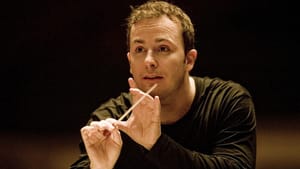Stay in the Loop
BSR publishes on a weekly schedule, with an email newsletter every Wednesday and Thursday morning. There’s no paywall, and subscribing is always free.
It ain’t the talent— it’s the chemistry
The Orchestra and the Eagles

Three paragraphs into his recent discussion of the Philadelphia Orchestra’s financial woes, the Inquirer’s Peter Dobrin suggested that lack of funds is forcing the orchestra’s managers to rethink their approach to the care and feeding of the world’s greatest musicians.
“Conservatories pump out superlative players by the dozens each year,” Dobrin noted. “Management appears to have made a supply-vs.-demand calculation that everyone is replaceable.”
That sounded familiar. And then I remembered: When this same Orchestra’s musicians went on strike in 1996, some of them threatened to start their own orchestra. I seized the opportunity to point out the elephant in the room.
“Most Americans — even business executives — pay lip service to the rhetoric that a business is nothing without its workers,” I wrote then in the Philadelphia Forum. “But in fact workers — even Philadelphia Orchestra musicians — are easier to replace than funders. The Philadelphia Orchestra may indeed produce one of the world’s half-dozen greatest classical sounds, but if all of its musicians perished in a plane crash, they could quickly be replaced by, say, the Curtis Institute student orchestra, and 95% of the audience couldn’t tell the difference, sound-wise.”
(At least one local music maven vehemently objected to this comparison. “There is a perceptible difference,” he insisted. “The Curtis plays with more energy.”)
Replacing ice cubes
My point — that capital is scarcer than talent — seems inarguable, at least in today’s marketplace. That’s why bankers make more money than teachers: Not because society values bankers more, but because their commodity is harder to come by. It explains why journalists and athletes, no matter how uniquely talented, are rarely able to create their own publications or sports teams. And it explains an inconvenient truth that underlies any discussion of major symphony orchestras past or present — namely, that the Philadelphia Orchestra’s board and management (no matter how uninspired they may seem) confront a tougher and more critical task than the musicians (no matter how brilliantly they may play).
But if capital is scarcer than talent, human chemistry is scarcer still. Both the Philadelphia Orchestra and the Curtis Orchestra owe their prestige and popularity not merely to their exquisite individual musicians, but to the chemistry that these magnificent musicians have developed by playing together for a long time. In an orchestra of nearly 100 high-strung musicians, such chemistry takes years to develop. Dobrin correctly pointed out the insidious damage that a great ensemble can suffer when individual players are replaced like interchangeable ice cubes in a freezer tray.
But don’t take my word for it. A suitable analogy is unfolding in Philadelphia this fall — not in music, but in football.
Chip Kelly’s deals
Like the Philadelphia Orchestra, the Philadelphia Eagles team consists of dozens of talented players (53, as opposed to the Orchestra’s current 95). But the key to the Eagles’ success lies not so much in the talent of its individuals as how well they play together. (Past quarterbacks Randall Cunningham and Donovan McNabb were superb athletes, and so was their star receiver, Terrell Owens, but somehow they never quite synched with their teammates.) The Eagles have produced contending teams for years, but they haven’t won a championship since 1960. Chip Kelly, their new coach, now in his third year, was determined to make them a championship team. So he began shuffling Eagles players like — well, like ice cubes in a freezer tray.
Kelly sent his quarterback, Nick Foles, to the St. Louis Rams for the much-ballyhooed Sam Bradford. He disposed of the Eagles’ star running back, LeSean McCoy, for the even greater (or so it seemed) DeMarco Murray of the Dallas Cowboys. He replaced superb linemen like Evan Mathis and Todd Herremans with equally superb linemen like Allen Barbre, Andrew Gardner, Matt Tobin, and Dennis Kelly. He released star receivers like DeSean Jackson, Jeremy Maclin, and Jason Avant until only Riley Cooper remained from the pass-catchers who predated Kelly’s arrival.
The new players may well be more talented than the players they replaced. But after seven games, Kelly’s wheeling and dealing has produced just three victories. Quarterback Bradford has yet to light a fire under his teammates. The highly touted running back DeMarco Murray is being outperformed by his backup, Ryan Matthews.
The reason, to me at least, seems plain: Football, like orchestral music, is a team game.
Fred and Ginger
Ask yourself: What’s the secret of the Borodin Quartet (70 years and counting, its musicianship passed on through the founders’ students), or for that matter Dolce Suono, Tempesta di Mare or Philadelphia’s Renaissance band Piffaro? Talent, sure — but as Dobrin implied, you can find talented musicians on any Center City street corner. The difference lies in the intangible way some musicians relate to each other.
Did you watch Fred Astaire and Ginger Rogers for their talent or their chemistry? And why were the great Wilt Chamberlain’s basketball teams perpetually overshadowed by the Boston Celtics?
“I don’t think it’s talent,” Kelly told reporters after the Eagles’ latest defeat. “I think it’s sometimes just a concentration issue with some of these guys.” Oh — so that’s why Madonna’s marriage to Guy Ritchie didn’t last!
Of course even ice cubes need to be refreshed periodically. And of course wealthy patrons are more in demand than great musicians. But synergy among a large team of people — that’s a rare and fragile commodity. Tinker with it at your peril.
Sign up for our newsletter
All of the week's new articles, all in one place. Sign up for the free weekly BSR newsletters, and don't miss a conversation.

 Dan Rottenberg
Dan Rottenberg